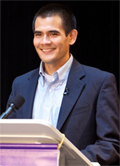Abstract:
Computers are now integrating into everyday objects, from medical devices to children's toys. This integration of technology brings many benefits. Without the appropriate checks and balances, however, these emerging technologies also have the potential to compromise our digital and physical security and privacy. This talk will explore case studies in the design and analysis of computer systems for several types of everyday objects, including wireless medical devices, children's toys, and automobiles. I will discuss the discovery of security risks with leading examples of these technologies, the challenges to securing these technologies and the ecosystem leading to their vulnerabilities, and new directions for security and privacy. For example, I will discuss efforts (in collaboration with UC San Diego) to compromise the computers in an automobile from a thousand miles away, and the implications and consequences of this and other works. I will also discuss directions for mitigating computer security and privacy risks, including both technical directions and education.
Bio (short):
 Tadayoshi Kohno is the Short-Dooley Professor of Computer Science & Engineering at the University of Washington and an Adjunct Associate Professor in the UW Information School. His research focuses on helping protect the security, privacy, and safety of users of current and future generation technologies. Kohno is the recipient of an Alfred P. Sloan Research Fellowship, a U.S. National Science Foundation CAREER Award, and a Technology Review TR-35 Young Innovator Award. Kohno is also a member of the National Academies Forum on Cyber Resilience, the IEEE Center for Secure Design, and the USENIX Security Steering Committee. Kohno received his Ph.D. from the University of California at San Diego.
Tadayoshi Kohno is the Short-Dooley Professor of Computer Science & Engineering at the University of Washington and an Adjunct Associate Professor in the UW Information School. His research focuses on helping protect the security, privacy, and safety of users of current and future generation technologies. Kohno is the recipient of an Alfred P. Sloan Research Fellowship, a U.S. National Science Foundation CAREER Award, and a Technology Review TR-35 Young Innovator Award. Kohno is also a member of the National Academies Forum on Cyber Resilience, the IEEE Center for Secure Design, and the USENIX Security Steering Committee. Kohno received his Ph.D. from the University of California at San Diego.
About NSF
The National Science Foundation (NSF) is an independent federal agency that supports fundamental research and education across all fields of science and engineering. In fiscal year (FY) 2009, its budget is $9.5 billion, which includes $3.0 billion provided through the American Recovery and Reinvestment Act. NSF funds reach all 50 states through grants to over 1,900 universities and institutions. Each year, NSF receives about 44,400 competitive requests for funding, and makes over 11,500 new funding awards.MORE
Founded in 1999, TV Worldwide (www.tvworldwide.com) developed the first Internet TV network of community-based Internet TV channels, primarily targeting niche professional communities ranging from the Maritime industry to the Digital Media sector. Known by many in the industry as "Internet TV for Smart People", Fortune 500 companies, 18 federal government agencies, and numerous International associations including the National Association of Broadcasters, utilize TV Worldwide's live and archived state-of-the art video streaming content applications and Internet TV channels. In recognition of the company's unique achievements in new media, TV Worldwide was selected by the National Academy of Television Arts and Sciences (NATAS) to webcast the Daytime Emmy Awards and the Emmy awards for Technology and Engineering 2007 through 2009. CEO Dave Gardy has been honored by Streaming Media Magazine in 2008 as one of the 25 Most Influential People in Streaming Media. Mr. Gardy also currently serves as the President of the International Webcasting Association (IWA) (www.webcasters.org).